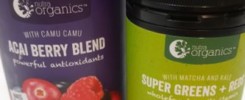Lion’s Mane is a type of mushroom that has been shown to have some extraordinary health benefits. It is Hericium erinaceus, also known as Yamabushitake, but most commonly called Lion’s mane. A review article published by the Journal of Agricultural and Food Chemistry in 2015 reviewed 139 primary research papers that describe the myriad of chemical compounds and their exceptional bioactive effects and lack of toxicity in rodents and humans. Most of this research is still in the stage of cell culture and animal studies but it looks extremely promising for humans and even for pets.
Lion’s Mane contains around 70 different metabolites that can be divided into 5 categories of organic compounds including erinacines (have neuroprotective properties), aromatic compounds, sterols (anti-inflammatory and anti-cancer properties), alkaloids, and lactones.
It has been shown to be beneficial for the following by either eating the mushroom fruiting bodies, consuming dried mushroom ground into a powder or bioactive extracts:
- Cancer – has been show to significantly inhibit the growth of leukemia cells, prostate cancer, liver cancer and has also been used in conjunction with anticancer drugs to increase the effects, and was shown to decrease the metastatic (spreading) abilities of colon cancer cells
- Heart disease and Hypertension – due to antioxidant and anti-inflammatory properties
- Diabetes – reduced diabetic neuropathy in rats given Lion’s Mane extract. Extract reduced blood sugar in diabetic rats after 28 days
- Neurological, cognitive and mood disorders – neuroprotective effects have been shown in many animal studies, shown that extracts stimulate NGF (Nerve Growth Factor) that protects neurons from degeneration and reversed memory and learning deficits in mice when added to their diet for 23 days.
- Fatigue – mice tested using extracts had less lactic acid production and increased stored glycogen and had increased exercise abilities
- Depression, anxiety, sleep issues, and menopause symptoms – reduced in human trial where women consumed dried mushroom powder for 4 weeks
- Hyperlipidemia (high fat in blood) – reduces “bad” LDL blood cholesterol in rats
- Increasing liver function – due to antioxidant effects, shown to protect mice from liver damage
- Acts as an antibiotic – has been shown to inhibit MRSA, which is a potentially deadly strain of antibiotic-resistant bacteria, extracts have also inhibited salmonella (a type of food poisoning) in mice and more studies are being done to see if it can also be used to treat E. coli, listeria, and cholera infections.
- Increases rate of wound healing – applying extracts on wounds in rats increased collagen-formation and rate of wound healing
- Reduces cellular senescence – senescence is when cells stop dividing when they get older. Reducing this process has huge implications for age-related diseases
So where can we buy these mushrooms or the extract as a supplement?
I have not been able to find Lion’s Mane mushrooms in a grocery store in London Ontario. I looked at Remark, Walmart, Metro, Soby’s, Sunripe, and Farm Boy, and they had the basic white buttons, crimini, and portabellos. The Asian Supermarket had the best variety of mushrooms including Enoki (one of my favorites), Oyster, and Shitakes but no Lion’s mane. All mushrooms are very healthy though, containing B vitamins, fiber, minerals like selenium, potassium, and magnesium, also a valuable food source of vitamin D, and antioxidants.
I found a few supplement brands that are sold on Amazon or in local health food stores. One called “Real mushrooms” that is 100% pure, organic powder and has been tested for active compounds. Other brands are “Lion’s Mane Ultra” or “Host Defense” that also have good ratings and reviews. When looking at supplements, it would be best if contained fruiting bodies as that is the component that shows a lot of health benefits. I also think that it is important to get organic supplements and you should read reviews of any products before buying them. I have not tried a Lion’s mane supplement before but after doing all the reading I did for this post I think I am going to give it a try and see what happens. I also found a ‘grow your own Lion’s mane’ kit online and that sounds too fun to not try as well ha. I will let you know how that works out.
I suggest that if you have any kind of major health issue and are on medications then you should talk to your doctor before taking any kind of supplements in case there are any interactions or contraindications.
If you or anyone you know have tried using Lion’s Mane, I would be interested to know the brand and any comments.
References
Note about my references. Many full text research articles are not available to the public. I can login to the pubmed database as an alumnus of Western University. If there are any articles that I reference in any post that you would like to have the full text pdf file for, then you can message me through my contact page and I will send you a copy.


Have always enjoyed fungi.( can’t sat the same for enployees) Great natural varieties in BC. Like to grow them here. Any info priceless!